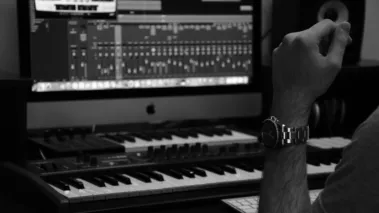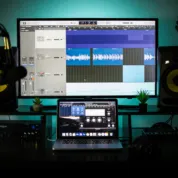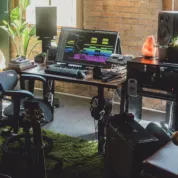
- 1. Ableton vs FL Studio: Price
- 2. Ableton vs FL Studio: Versions
- 3. Ableton vs FL Studio: Features
- 4. Ableton vs FL Studio: Working with MIDI
- 5. Ableton vs FL Studio: Workflow & Song Arrangement
- 6. Ableton vs FL Studio: System Requirements
- 7. Ableton vs FL Studio: Plugins & Virtual Instruments
- 8. Is Logic Pro better than Ableton or FL Studio?
- 9. Overall Winner
There are plenty of Digital Audio Workstations (DAWs) on the market, each with their own tools and features. An ongoing argument has emerged regarding which is the best DAW, with some advocating for Ableton Live and others asserting that FL Studio is superior. While the two are interchangeable, there are significant differences between them that could have a considerable impact on your next project.
When it comes to Ableton vs FL Studio, both great for production, but Ableton is designed to also be used as a live performance tool, with a session view that allows for flexible arrangement and improvisation. FL Studio on the other hand, is primarily a pattern-based sequencer that is well-suited for creating loop-based music, with a playlist view for arranging patterns into a linear composition. Ultimately, the choice depends on the specific needs and preferences of the user. In this article we're going to compare the most prevalent features of each one, to help you decide which is the best fit for your next project, Ableton or
FL Studio.
Ableton vs FL Studio: Price
Ableton Price
Ableton Live has been on the market since 2001, and has been the go-to DAW for many musicians today. It comes with three versions:
- Intro, selling for $99 (or $124.85 for six months), whose main features includes 16 audio and MIDI tracks and scenes, eight mono input and output channels as well as two send-and-return tracks.
- Standard, the second option is $449 (or $74.85 for six months) and comes with unlimited audio and MIDI tracks, 12 send and return tracks and an astonishing 256 mono input and output channels (plus much more). The Standard also includes audio-slicing, linked track editing and audio to MIDI options, which the Intro version does not come with.
- Suite, the last version comes at a costly $749 (or $124.85 per six months), which includes all the same features that the Standard version has, however on top of that, it also comes with a max for live option.
FL Studio Live Price
FL Studio comes with four different versions, all of which include a free lifetime update:
- Fruity, the entry level version costs $99 and comes with no audio editors, recordings and clips and 84 instruments and effects.
- Producer, the second version comes in at $199. It has two audio editors and 91 instruments and effects.
- Signature, the third version you can get for $299, which includes three audio editors and 99 instruments and effects included.
- All Plugins, is the final version for $499. Just like the name suggests, this version of FL Studio comes fully equipped with all the plugins. Some of the key features include three audio editors and 111 instruments and effects.
All of these packages are a one-time purchase and have no option of a monthly or yearly subscription.
Winner: FL Studio
When it comes to Ableton vs FL Studio different edition costs, FL Studio definitely has more variety. The Signature edition has almost everything that FL Studio offers, and on top of that it is a one-time purchase. Ableton’s Standard edition doesn’t come with nearly as much as the Suite edition comes with, and it is already $499. The Suite edition is $749, which is more than any of the FL Studio editions cost.
Ableton vs FL Studio: Versions
Ableton vs FL Studio: Features
Ableton Features
Overall, Ableton Live is best suited for MIDI users, but it is not limited to that, it can definitely handle any live sound coming in. It is also not a CPU intensive program, like a lot of the other DAWs. Another advantage of Ableton is the session view which can support multi-threading, creating an optimal user experience. Not only that, but the graphical user interface is extremely easy, and the basic use of it can be learned within a few hours of browsing through the DAW.
With that being said, the price of Ableton is significantly higher than most of the
other DAWs on the market, most of which can provide more or less the same effect. However, it is worth
mentioning the high quality of sounds that are able to be made in this program, which is why this is such a
popular DAW on the market today. Ableton also requires higher computer specifications to be able to run the
program smoothly and without lagging, which can take away from the overall user experience if your computer does not
have the right specs.
FL Studio Features
FL Studio has a lot of different plugins and options, creating an ultimate user experience for people who prefer to have a lot of options when creating music. The program was made to be easy to use, which is ideal for quick audio editing (e.g. make a quick edit to a song or add a new part to an existing song). This also makes FL Studio an easier and faster learning experience for new musicians.
FL Studio provides free life-time updates (which includes all the audio plugins), making the program a one-time purchase.
Winner: Ableton
Due to the simplicity of the program, FL Studio is missing some of the key features which are included in Ableton, giving Ableton the edge. However, the necessity of these Ableton vs FL Studio features ultimately depends on your individual needs and workflow.

Ableton vs FL Studio: Working with MIDI
Does Ableton Live have MIDI?
Yes! With Ableton Live, you can create MIDI clips, use MIDI controllers to play software instruments or control effects, and record and edit MIDI data. Additionally, Live's MIDI editing capabilities allow you to quantize, transpose, and manipulate MIDI notes in a variety of ways.
How do I use MIDI in Ableton?
To get started with MIDI in Ableton Live you simply connect your MIDI controller to your computer using a USB cable or MIDI interface, create a MIDI track, and update the track's MIDI input settings. But Ableton offers many advanced features for MIDI editing and manipulation as well.
One of the best features about Ableton is the ability to recall your ideas after playing them without having to press the record button. This is ideal for developing ideas, especially when you are working on a specific part and you forget to press record, the Capture MIDI function allows you to capture your rehearsals into MIDI clips. The Live 11 update also introduces a new feature called the Chance Tool, which denes whether or not a MIDI note is going to be played using percentages. This allows the user to add variety to their track and make it more interesting and unique.
You can also pair it with the Note Chance and Velocity Chance tools for an even more
interesting outcome. Overall, Ableton Live's MIDI features make it a versatile tool for music production, performance, and composition.
How do I get MIDI in FL Studio?
To get MIDI input working in FL Studio, you'll need to connect your MIDI controller to your computer sing a USB cable or MIDI interface, and configure it within FL Studio. Once set up, you can use it to play software instruments, trigger effects, and record and edit MIDI data.
One of the most talked about features in FL Studio is the prized piano roll. It has a lot more MIDI editing tools than Ableton's piano roll, and is a lot easier to t into the interface. It also allows the user to use the piano roll for editing automation data. It has multiple options such as Strum, Glue, Arpeggiate, Paint, Slice and Stamp, all of which are ideal for complex editing.
Do you need a MIDI controller for FL Studio?
No, you can use FL Studio without MIDI. It supports a wide range of audio recording, editing, and processing functions, including the ability to work with audio files without MIDI input. FL Studio also offers a range of audio editing tools, such as pitch and time correction, slicing, and manipulation, that allow you to create music without MIDI input.
However, it's worth noting that MIDI can be very powerful in FL Studio for production and composition, allowing you to trigger virtual instruments, control effects, and record and edit MIDI data.
Winner: FL Studio
Ableton offers a better plug-and-play support for MIDI. Whereas FL Studio needs more manual labor to sync your controller, which is a little odd, given the ability of most DAWs to automatically recognize MIDI controllers, especially in today's day and age. However with that being said, the Ableton vs FL Studio winner for this category would be FL Studio, with endless MIDI editing capabilities and their workflow efficiency
Generally speaking, Ableton feels like a more honest and straightforward experience. It routes the mixer tracks automatically, saving you time from having to mess with the different mixer routes, because every channel is its own mixer or effect strip.
The two DAWs are mostly MIDI based, and FL studio has a way better piano roll mode, with better controls. At the moment, Ableton lacks good MIDI support, making the user experience more complicated.
Ableton vs FL Studio: Workflow & Song Arrangement
Ableton Workflow
Right off the bat, neither Ableton or FL Studio are ideal for audio recording, it is doable, but not as efficient as
with other DAWs (such as Logic Pro, which we mention as a 3rd alternative below). Recording in Ableton is easier than in FL Studio. The set up and
workflow process is simple and easy, allowing you to save a lot of time. A great feature that Ableton provides is
the Audio Warping algorithms, allowing you to manipulate the sound in any way you want. If something is off beat, you can stretch the audio and make it longer or shorter, in order to match your song.
Ableton Arrangement View
One feature that makes Ableton stand out is the ability to audition multiple arrangements in the session view. This is particularly helpful for creating and experimenting with song structure. Ableton makes it very easy to set up complex effects chains and drum sample racks, which you are then able to record and arrange into a song.

FL Studio Workflow
In FL studio, multitrack recording is tough and complicated. On top of that, the basic edition of the program does not provide any audio manipulating capabilities. In order to get any of the basic functions such as record and edit audio or drop audio clips onto the playlist, you would have to purchase the Producer edition. If you do choose to record audio in FL Studio, mixing in the program is pretty powerful, and the tracks can be easily assigned to a mixer channel, after which you can choose from a variety of different effects to shape and manipulate the sound. It is also possible to assign multiple tracks to the same channel, which is particularly helpful for any group or bus styled mixes.
FL Studio Sequencer
FL Studio on the other hand is more flexible, allowing one thing to be done in a dozen ways. This allows for the user to choose the most convenient workflow for them, however at the same time, this can be very daunting for beginners. A great feature in FL Studio is the built-in step sequencer, which allows you to build a drum loop in seconds just by punching in steps on the sequencer.
Winner: Ableton
The Ableton vs FL Studio winner in this category is Ableton Live, as the workflow in FL Studio is a little clunky. FL Studio is great for jotting down short loops and quick ideas, as opposed to Ableton, which is able to produce higher quality songs.
Recording audio in either of these programs definitely comes down to the user experience and personal preference. But Ableton Live comes with powerful audio effects and the ability to further manipulate audio, something that FL Studio lacks at the moment.
Ableton vs FL Studio: System Requirements
When it comes to computer specifications, FL Studio supports 32 and 64 bit plugins, however with Ableton, you will need a third-party tool in order to get the 32 bit plugins into 64 bit. Ableton also requires a much stronger computer, which is something to keep in mind if you have an older computer. It has a reputation for being more demanding on CPU usage, particularly when using features such as real-time audio warping, which can be processor-intensive.
FL Studio is known for being relatively lightweight and efficient, even on older hardware. This is in part due to its modular approach to plugin processing, which allows for greater control over CPU usage and processing power.
Winner: FL Studio
It's worth noting that both DAWs have features and settings that allow you to optimize CPU usage and performance. For example, you can reduce the number of tracks, lower the buffer size, or disable real-time audio warping to reduce CPU usage in Ableton Live. Similarly, in FL Studio, you can adjust the audio quality settings or use third-party plugins that are optimized for CPU performance.
Ultimately, the CPU usage between Ableton vs FL Studio will depend on various factors and how you use the software in your music production workflow. It's a good idea to experiment with different settings and techniques to optimize CPU usage and ensure smooth playback and performance.
Ableton vs FL Studio: Plugins & Virtual Instruments
Ableton Plugins & Virtual Instruments
Ableton Live's native plugins are focused on creative sound design, with a particular emphasis on electronic and experimental music production. Some of the most popular plugins in Live include Operator, a versatile FM synthesizer, and Wavetable, a wavetable synthesizer that allows for extensive modulation and sound shaping. Live also comes with a range of effects plugins, such as EQ, compressors, and delay, as well as unique devices such as the MIDI effect Chord and the audio effect Frequency Shifter.
FL Studio Plugins & Virtual Instruments
FL Studio, on the other hand, is known for its extensive collection of plugins and virtual instruments, which cover a wide range of genres and styles. Some of the most popular plugins in FL Studio include Harmor, a powerful additive synthesizer with advanced resynthesis capabilities, and Sytrus, a versatile FM and additive synthesizer. FL Studio also offers a range of effects plugins, such as reverb, distortion, and filtering, as well as unique devices such as the Edison audio editor and the Fruity Granulizer granular synthesis plugin.
Winner: Ableton
Regarding the stock plugins, the Ableton vs FL Studio winner here is definitely Ableton. With better compressors and limiters, these are crucial features for many users. However, FL Studio has great synths such as the Sytrus and Harmor, which are much loved by the production community.
Is Logic Pro better than Ableton or FL Studio?
If you are a MAC user, there is also a third option, much preferred by a lot of producers. The third DAW to consider would be Logic Pro, which comes for $199.99, a lot cheaper than most of the editions of both Ableton and FL Studio. It has great synths and instruments, which are a lot better than most of the other DAWs on the market. On top of that, Logic is great for everything, from working with MIDI to recording audio.

Overall Winner
Ableton Live
With Ableton vs FL Studio splitting our categories winning 3 each, you could easily make an argument for either one. Which is more reason why you really should try both.
However, Ableton's popular session view allowing for non-linear and improvisational music creation, with the ability to trigger clips, loops, and scenes in real-time, is too powerful to not give it the edge. It is also incredibly useful for live performances and generating ideas quickly in the studio. While FL Studio has some similar functionality, Ableton's session view, effects, and versatility are specifically designed to facilitate a more fluid and dynamic approach to music creation.
Many producers work with both, depending on their environment and project needs. After all, if you are working on a project with another producer, it is a lot easier to collaborate if you're using the same software. So if you can't decide which DAW to use after reading all of this, why not give both a try? Ableton Live's 90-day free trial can be found here, and FL Studio's free trial here. At Band Pioneer we exist to help you succeed as a musician. So contact us if you have additional questions, or topics that you think would be beneficial for us to cover.







Leave a Reply!
They usually provide detailed information about the new features, improvements, and bug fixes in each version of the software. The above instructions are great but may not be applicable to any specific version.
I've been using Ableton Live for so many years that I'd never even consider anything else. Sometimes familiarity is whats most productive
Appreciate the depth of info! You seem to be looking for meaningful information, while others are just regurgitating info you can find on the product's homepages.
That said, I lean towards FL having used Fruity Loops since the early 2000's. If you favor sequencing it's definitely the way to go. Otherwise people seem to favor Ableton.
IDK, I have to disagree with your preference for Fruity Loops. In my experience, Ableton DAW and offers more creative possibilities and is more versatility. Most of the industry is leaning that way too.